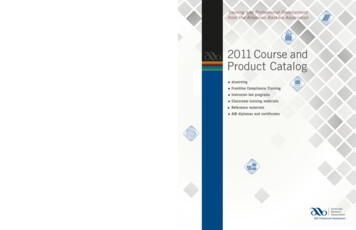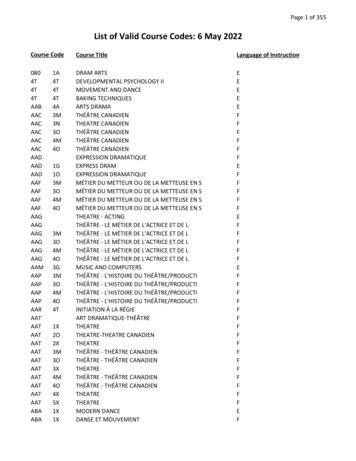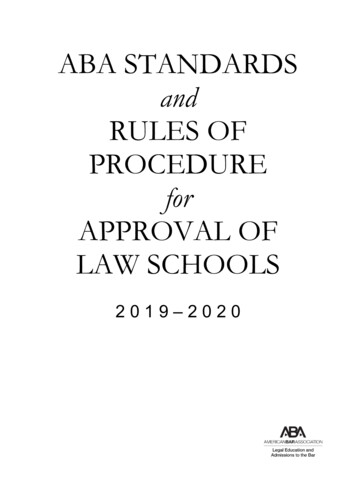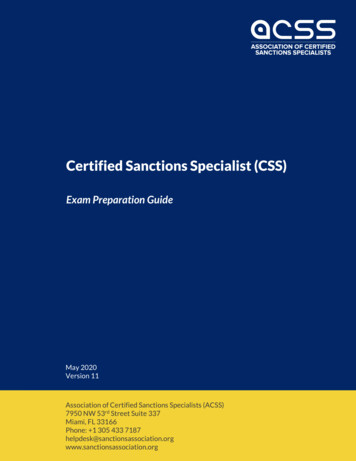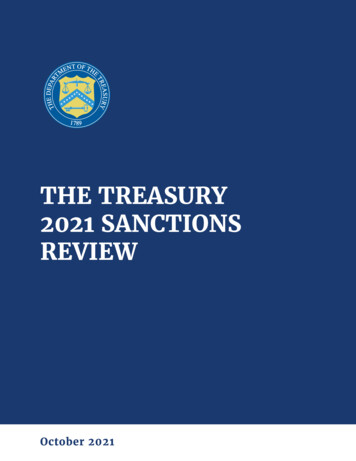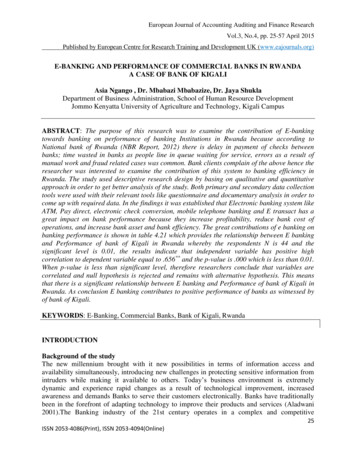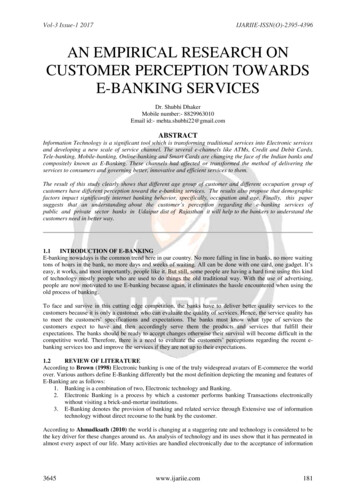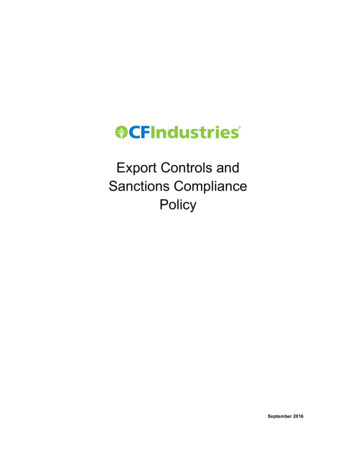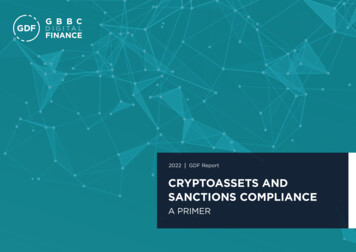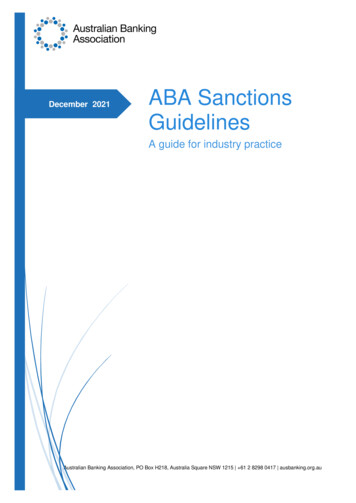
Transcription
December 2021ABA SanctionsGuidelinesA guide for industry practiceAustralian Banking Association, PO Box H218, Australia Square NSW 1215 61 2 8298 0417 ausbanking.org.au
Table of Contents1.Introduction22.Sanctions Overview23.2.1Designated Persons/entities32.2Asset Freezing, Screening, Transaction Monitoring and Reporting32.3Permits32.4Offences and Penalties42.5Extra Territorial Considerations52.6Sector-specific sanctions5Due Diligence and Know Your Customer (KYC)3.14.5.Assessing Customer, Vendor, Connected Parties’ and Beneficial Owner Sanctions RiskSanctions Screening5664.1Screening Timing, Methods and Considerations74.2Transaction/Payment Screening84.3Trade Transaction Screening84.4Customer/Name Screening8Sanctions Alert Management95.1Requests for Information (RFI) and Customer Contact95.2Potential Matches and False Positives95.3True Matches95.4Freezing Assets and Accounts96.Quality Assurance107.Circumvention of Sanctions108.Governance, Oversight, Training and Record Keeping109.8.1Senior Management Governance and Oversight108.2Staff training118.3Procedures and Record Keeping11Outsourcing of Sanctions Controls11Australian Banking Association, PO Box H218, Australia Square NSW 1215 61 2 8298 0417 ausbanking.org.au1
1.IntroductionThe ABA Sanctions Guidelines (Guidelines) are intended to provide a set of good industry practices forAustralian Banking Association (ABA) Member banks (Members) in meeting their legal and regulatoryobligations. Non-Members and other members of the Australian financial services industry may alsobenefit from the Guidelines.The Guidelines are not legally binding, nor are they approved by Australian regulatory bodies or theDepartment of Foreign Affairs and Trade (DFAT). However, they have been developed in consultationwith regulators, and set out industry good practice domestic sanctions requirements and incorporateglobal regulatory guidance. Members should therefore adopt into their Sanctions ComplianceFramework elements of these Guidelines which are in keeping with their risk profile, having regard tothe nature, size and complexity of their business.These Guidelines are limited to obligations applicable to Australian financial institutions underAustralian sanctions laws administered by DFAT. They have nevertheless been developed withreference to the broader Australian legislative and regulatory framework, including but not limited toobligations under the Anti-Money Laundering and Counter-Terrorism Financing Act 2006 (Cth)(AML/CTF Act) and Anti-Money Laundering and Counter-Terrorism Financing Rules Instrument 2007(AML/CTF Rules), which are the subject of separate industry guidance. While these guidelines reflectsanctions regulation, organisations should ensure they also consider obligations under the AML/CTFAct, including overlap between certain sanctions requirements and anti-money laundering and counterterrorism financing obligations and suspicious matter report (SMR) obligations triggered in relation tocontraventions or attempted contraventions of Australian sanctions laws. Organisations should alsoconsider the sanctions obligations imposed by other jurisdictions where applicable.As the Guidelines leverage the Wolfsberg Guidance on Sanctions Screening, it is recommended bothdocuments be read in conjunction with each other. There may be other guidance, obligations, and/orrequirements that members will need to consider having regard to the nature, size and complexity oftheir business.Members are also encouraged to be familiar with relevant Financial Action Task Force (FATF) guidancesuch as Guidance on Proliferation Financing Risk Assessment and Mitigation which urges privatesector entities to have in place processes to identify, assess, monitor and manage proliferationfinancing risks, adding that private sector entities may do so within the framework of their existingtargeted financial sanctions and/or compliance programmes.1Members should also refer to the various resources and fact sheets available on the AustralianDepartment of Foreign Affairs and Trade, Australian Sanction Office (ASO) website.22.Sanctions OverviewSanctions are measures not involving the use of armed force that are imposed in situations ofinternational concern.Australia implements two types of sanctions:1. United Nations Security Council sanctions (often referred to as multilateral sanctions), whichAustralia must impose as a member of the United Nations. United Nations Security Councilsanctions are implemented by means of regulations made under the Charter of the UnitedNations Act 1945 (Cth) (COTUNA), and2. Australian autonomous sanctions which are imposed as a matter of Australian foreign policy.Autonomous sanctions are implemented by means of the Autonomous Sanctions Regulations2011 made under the Autonomous Sanctions Act 2011 (Cth).1INTERNATIONAL BEST PRACTICES (fatf-gafi.org) page 3 para 1 and Guidance on Proliferation Financing Risk Assessment andMitigation (fatf-gafi.org) page 3 para 22Australia and sanctions Australian Government Department of Foreign Affairs and Trade (dfat.gov.au)Australian Banking Association, PO Box H218, Australia Square NSW 1215 61 2 8298 0417 ausbanking.org.au2
Examples of sanctions measures which may be relevant to the Australian banking industry include: Targeted financial sanctions (including asset freezes) on designated persons and entities Restrictions on trade in goods and services (including ‘arms or related materiel’), and or Restrictions on engaging in certain commercial activities.Australian sanctions laws apply to all activities in Australia as well as to all activities undertaken byAustralian citizens and Australian registered bodies corporate overseas. It follows that these Guidelinesdeveloped for ABA Members will also capture all activities of all persons in Australia as well as theactivities of Australian citizens and Australian registered bodies corporate overseas.The consequences of failure to comply with Australian Sanctions are serious for individuals and bodiescorporate. Sanctions offences are strict liability offences for bodies corporate, meaning that it is notnecessary to prove any fault element (intent, knowledge, recklessness or negligence) for a bodycorporate to be found guilty. On this basis, and because sanctions laws reflect UN efforts to engenderinternational peace and security and Australian Government foreign policy, compliance with sanctionslaws is considered part of corporate and social responsibility good practice.2.1Designated Persons/entitiesAustralian sanctions laws include targeted financial sanctions which prohibit persons from makingassets available to ‘designated persons and entities’, and from dealing with or using their assets(freezable or controlled assets). The DFAT Consolidated List contains the names of all persons andentities designated under Australian sanctions law.The DFAT Consolidated List is available on the DFAT website: /sanctions/Pages/consolidated-list.aspx. The List changes frequently and Membersshould monitor for updates on a regular basis. Members can also subscribe to the Australian SanctionsOffice’s mailing list to receive notifications on updates to DFAT’s Consolidated List.Members should be aware that certain targeted financial sanctions apply to non-designated persons orentities acting at the direction of or on behalf of designated persons, and to non-designated entities thatare owned or controlled by designated persons.32.2Asset Freezing, Screening, Transaction Monitoring and ReportingWhere Members become aware that they hold freezable or controlled assets, Members are legallyrequired to provide the Australian Federal Police with specific information about the assets under theCharter of the United Nations (Dealing with Assets) Regulations 2008 and the Autonomous SanctionsRegulations 2011. Members should also inform DFAT’s Australian Sanctions Office (ASO).Members’ AML/CTF Programs should effectively identify, mitigate and manage money laundering andterrorism financing risk, including where such risks arise from the potential breach, non-implementation,or evasion of sanctions obligations. In particular, members should ensure that their Screening andTransaction Monitoring Programs include appropriate risk-based systems and controls, including toidentify any transactions or attempted transactions that may be relevant to the investigation of asanctions offence and which trigger an obligation to submit a suspicious matter report (SMR) toAUSTRAC. It is important to regularly assess the design and effectiveness of these controls inmitigating the sanctions risks.2.3PermitsIn certain circumstances, a bank’s customer may apply to the Minister for Foreign Affairs (or theMinister’s delegate) for a sanctions permit to authorise activities, such as a transaction or making a3Some jurisdictions further specify a default rule to determine the scope of ownership and control, such as the UK, EU or the US. In the US, forexample, any entity that is 50% or more owned or controlled by sanctioned persons is also itself sanctioned. It is not clear whether such a ruleapplies under Australian law or regulations, and there is no guidance issued by Australian regulators on this point.Australian Banking Association, PO Box H218, Australia Square NSW 1215 61 2 8298 0417 ausbanking.org.au3
facility or finance available, that would otherwise be prohibited under Australian sanctions law.Members should consider the processes they have in place when a customer seeks to undertake anactivity which requires one or multiple sanctions permits.While there is no exhaustive definition in law of arms or related materiel,4 restricted goods or servicesthat a bank’s customer may seek to import or export can include equipment, weapons, military vehicles,spare parts, computer technology or software related to such items. A good starting point is to checkwhether goods are listed on the Defence and Strategic Goods List which sets out various goods,software or technology subject to Defence Export Controls.5Before a Member provides financial services to a customer that could result in a breach of a sanctionslaw, the Member should obtain from the customer full details of the transaction and a copy of thesanctions permit. Members are not required to facilitate transactions/relationships outside of their riskappetite even if there is an applicable sanctions permit.When seeking the transaction details and sanctions permit, it is good practice for the Member to: confirm the authenticity of the permit with the ASO if this is in doubt check that the counterparty holding the permit is the party to whom it was issued check that the details of the permit correspond with the details of the transaction anddocumentation provided by the customer, and that the permit remains current ensure that the permit includes the Member as a party to the relevant transaction (eitherby name or by description), and if it does not, either apply to the ASO for a permit for thefinancial services relating to the permitted transaction or request the customer to seek anamendment to the original permit to include the Member as a party to the transaction.Any discrepancy should be investigated and where appropriate reported to the ASO. Where theMember suspects that the discrepancy may be relevant to the investigation of an offence, the Membershould submit a suspicious matter report to AUSTRAC.2.4Offences and PenaltiesBanks are subject to sanctions offences including the following, unless otherwise authorised: Making an asset available to designated persons or entities Dealing with or using freezable or controlled assets, and Providing financial services in relation to activities subject to sanctions.These offences are strict liability offences for bodies corporate (including banks), meaning that it is notnecessary to prove any fault element (intent, knowledge, recklessness or negligence) for a bodycorporate to establish an offence. A defence is however available for bodies corporate that can provethey took reasonable precautions and exercised due diligence to avoid contravening the relevant law.Members should have in place procedures to manage the risk of breach, non-implementation orevasion of Australian sanctions law. Inadequate due diligence by an employee could leave both theemployee and the employer open to prosecution if the employee’s actions were judged to be reckless.This includes individual criminal liability for employees, even if the proven application of due diligenceand reasonable precautions exonerates the employer. In addition, where an employee does not meetthe threshold for recklessness, the employer may be found liable if it is shown that the employer failedto take reasonable precautions or exercise due diligence.These guidelines provide advice to Members in relation to what may constitute reasonable precautionsand due diligence for the purposes of a defence to the offences under Australian sanctions law.4Factsheet: Arms or Related Matériel Australian Government Department of Foreign Affairs and Trade (dfat.gov.au)5Defence Export Controls (DEC) regulates the export and supply of military and dual-use goods and technologies. See here for moreinformation: rt/controlsAustralian Banking Association, PO Box H218, Australia Square NSW 1215 61 2 8298 0417 ausbanking.org.au4
2.5Extra Territorial ConsiderationsMembers should ensure that their sanctions compliance frameworks cover the sanctions laws of foreignjurisdictions that may apply to their foreign branches and subsidiaries (such as sales or representativeoffices), or where there may be an extra-territorial impact on the Member.In conducting payment screening, Members should consider the facts of each transaction. The facts ofa transaction may include indications that the recipient could be in an industry or geography wheresanctions concerns are likely heightened, for example a shipping company in North Asia or a miningcompany in Africa. Alternatively, the data available in the transaction payment text or instructions mayindicate a nexus to various jurisdictions, which in turn may (depending on the nature of the nexus) bringthe sanctions laws of those various jurisdictions to bear on the transaction.In particular, Members should be aware of the extra-territorial considerations when dealing with theUnited States. Transactions that involve a US Person or the US financial system may activate thejurisdiction of the US for sanctions purposes, even though those transactions may originate and endoutside the US (e.g., USD denominated transactions cleared in the US).Also, US “secondary sanctions” may apply even where there is no effective nexus with the US – simplydealing with certain US sanctioned jurisdictions, designated persons or industries may activate theseextra-territorial sanctions whether a US element exists in the transaction or not.2.6Sector-specific sanctionsAustralia imposes sector-specific sanctions. These sanctions are usually imposed on a specific sectorof the economy of a sanctioned jurisdiction, in respect of certain activities only. For example, sanctionsmay prohibit certain activities being undertaken with named members of certain industry sectors, suchas finance, energy and defence, in a particular jurisdiction.Members’ sanctions compliance frameworks should distinguish between sector-specific sanctions andother targeted financial sanctions, such as asset freezes.3.Due Diligence and Know Your Customer (KYC)Customer due diligence, to know your customer, requires collecting information about a customer, andchecking it to confirm that the customer, and where applicable, a person connected to the customer(e.g. the beneficial owner or an ultimate controller or persons acting on behalf of the customer), is not adesignated person. When providing AML/CTF Act designated services, customer due diligence mustbe conducted in line with requirements under the AML/CTF Act and Rules and where sanctions risksare higher, the Member should consider applying enhanced customer due diligence where requiredunder the AML/CTF Act. In addition you may wish to consider additional due diligence from a sanctionsperspective where appropriateIt should be noted that Member banks may provide services to customers which lie outside of theobligations of the AML/CTF Act and Rules. It is not expected that in those circumstances additionalinformation should be collected beyond that which is already obtained during the normal course ofbusiness, or which is specified in any existent regulatory guidance, unless the assessment of sanctionsrisk undertaken by the business for such non-designated services indicates that a higher risk maywarrant additional information collection.Consistent with this, sanctions due diligence will vary depending on the individual Member’sorganisational risk profile, customer base demographic, physical and operational location and domesticand international regulatory obligations.Members’ sanctions compliance frameworks should have regard for the risk presented by customerrelationships and customer activities, including transactional activity. The sanctions complianceframework should be designed to identify, manage and mitigate sanctions risks end-to-end andthroughout the customer relationship and life cycle.Australian Banking Association, PO Box H218, Australia Square NSW 1215 61 2 8298 0417 ausbanking.org.au5
3.1Assessing Customer, Vendor, Connected Parties’ and Beneficial OwnerSanctions RiskMembers should consider the criteria to be factored into a customer/vendor/connected party sanctionsrisk assessment, including but not limited to industry sector, geography, product type andcustomer/relationship type. These criteria should ideally be reflected in an enterprise-wide or grouplevel sanctions risk assessment. In some instances, customers and connected parties will require moredue diligence.A Member may consider a customer, vendor or connected party to be a higher risk from a sanctionsperspective and subject to enhanced sanctions due diligence if that customer/vendor/connected party: has substantive business activity involving sanctioned countries or regions operates in an industry or sector that involves goods or services which, if provided to aparticular sanctioned country, region, person or entity, would be subject to sanctionrestrictions, and/or is an entity that is domiciled or registered in a sanctioned country/regionHaving regard to sanctions risks associated with customers, vendors or connected parties, Membersshould, during the establishment of the relationship, collect the names of beneficial owners of thecustomers, vendors or connected parties, in line with their AML/CTF Programs or other Financial CrimePrograms (e.g. Anti-Bribery and Anti-Corruption (ABAC) compliance programs).Member vendor and connected party relationships may also present sanctions risks. Appropriate duediligence processes to identify and assess these risks should be in place. Ordinarily, these would be inkeeping with the due diligence and KYC procedures applied to customer relationships, appropriatelydesigned to address the uniqueness of vendor and connected party relationships.Members should also have risk-based processes in place to periodically update the details of names ofbeneficial owners and controllers as collected.4.Sanctions ScreeningSanctions screening is not mandated by law. Rather sanctions screening is a tool which assistsMembers to comply with sanctions laws and may form part of risk-based systems and controls toidentify, mitigate and manage the risk of breaching sanctions laws and to support Members’ in meetingtheir obligations to submit SMRs. As a result, Members should assess their risk of breaching sanctionslaws based on their location(s), size, business, customer types, products, delivery channels, geographicrisks and other relevant factors and adopt a sanctions screening regime that is most likely to assistthem in complying with obligations under applicable sanctions laws.This risk-based and highly individualised approach to sanctions screening means that Members may insome instances adopt similar approaches to sanctions screening, while differing in others. By way ofexample, while there is broad industry consensus regarding some aspects of payment screening (suchas the need to sanctions screen international transactions) there are differences of opinion regardingother things (such as sanctions screening of domestic transactions).It is generally accepted that Members should sanctions screen two data sources, being transaction andreference data. Transaction data is the data contained in payment instructions / messages and tradetransactions. Reference data includes all other data known to Members, which may be relevant tocomplying with sanctions laws. It includes customer data but may also extend to employee data,vendor data, and other information in the Member’s records which could, if screened, mitigate againstbreaches of sanctions laws. In line with the risk-based approach to screening, Members may elect toscreen as many or as few relevant transaction data elements and reference data elements asreasonably necessary to mitigate their sanctions risks.Despite the divergence in approaches to sanctions screening by Members, the Wolfsberg Guidance onAustralian Banking Association, PO Box H218, Australia Square NSW 1215 61 2 8298 0417 ausbanking.org.au6
Sanctions Screening is generally regarded as best practice for sanctions screening. It containsvaluable insights into: what constitutes sanctions screening the place for sanctions screening as part of a wider integrated financial crime complianceprogramme screening technology and generating productive alerts reference data screening transaction data screening list management, and lookbacks.The Wolfsberg Guidance on Sanctions Screening (as amended) forms part of these Guidelines.4.1Screening Timing, Methods and ConsiderationsScreening can take many forms, from basic methodologies to more sophisticated algorithms. As aresult, screening can be automated or manual, use exact name matching or fuzzy matching logic.Members should consider the screening methods that are appropriate for the scale and risk faced bytheir institution.Members may design their own screening solutions which should be applicable to transaction data andreference data. These solutions should consider: The operational context within which transactions are presented, i.e., real-time, near realtime and/or batch processing The inherent and residual risks within the customer base such that these inform the leveland/or likelihood of sanctions risks present in business and transactional activity The product and/or channel parameters that influence the way in which a screeningcapability can be designed such as source data, including rich text format and overlayservice information, and whether that is helpful to identifying sanctions risks andconsequently the sensitivity of detection rules and thresholds The means through which it may be possible to identify re-submitted transactions ortransactions that have been subject to text manipulation and/or stripping Other compliance frameworks that may supplement and support the Member’s sanctionscompliance framework, for example correspondent banking due diligence activities Legislative and regulatory frameworks that may supplement and support the Member’ssanctions compliance framework and obligations incumbent within those frameworks,such as customer due diligence obligations under the AML/CTF Act Standardised procedures including escalation models for due diligence activities relatedto domestic and cross-border transactions Enhanced monitoring to determine the customer, vendor, connected party, or employeeand/or transactions that require enhanced levels of investigation and developing specificescalation processes Consideration of measures such as whitelisting or system rules to appropriately managefalse positive volumes, and Quality assurance and data integrity checks as part of the internal compliancemanagement arrangements.Australian Banking Association, PO Box H218, Australia Square NSW 1215 61 2 8298 0417 ausbanking.org.au7
4.2Transaction/Payment ScreeningAt a minimum Members should screen the names of the payer, payee and each intermediary recordedin international payments against designated person lists. Members should consider whether it isappropriate to screen other payment instruction/message fields to identify links to jurisdictions oractivities sanctioned by Australia or other relevant jurisdictions.To support sanctions screening activities across the industry, and in keeping with payments systemsrules and guidelines, Members should ensure that all outward payment instructions / messages theycreate contain all available name and relevant address information for beneficiary, remitter andintermediaries, using Latin characters and verified KYC details where possible. Consideration should begiven to the approach to screening payment instructions that contain non-Latin characters.Where beneficiary and remitter information is missing from an inward payment message / instruction,Members should consider how to mitigate sanctions risk, particularly where involving jurisdictionssubject to sanctions or higher diversion risk.Where multiple transfers are bundled into a single batch file, the payment instruction / message maynot contain the beneficiary and remitter information or full transparency of the end-to-end payment.Members’ risk assessment and controls should take account of the risk of such payments being for thepurpose of sanctioned activity.4.3Trade Transaction ScreeningMembers should consider the various forms of information presented to an institution during a tradetransaction that could be screened, for example, trade SWIFT messages as well as the content of tradedocumentation received in the normal course of business. Information in trade documentation, inaddition to names of all involved parties, that may assist in identifying potential sanctions risks forfurther assessment include such things as dual-use goods, shipping routes/methods/vessels/goods andred flags, such as transhipment.4.4Customer/Name ScreeningMembers should consider the industry wide practice of two-way screening of customers. Customerscreening should take into consideration changes to data and list information, the frequency of periodicscreening and the justification for the chosen frequency. The industry appears to be moving towardstwo-way daily or weekly periodic screening.Generally, new customers should be screened before providing services as well as when there is anymaterial change to the customer record. However, in circumstances where it is not reasonably possibleto screen customers before providing services, Members should ensure they take reasonablemeasures to mitigate any potential breach of sanctions laws. Periodic re-screening should be thestandard y for all Australian financial institutions, with more frequent re-screening being moreappropriate for those with greater sanctions risk.6Members should screen the names of customers, beneficial owners, associated parties, employees,and vendors against designated person lists during the establishment of a relationship or account, andon an ongoing basis over the course of the relationship.6A Delta-Delta screening refers to the practice of rescreening a customer base when there is a change to the regulator list to identify newcustomers identified, and a rescreening when there has been a change to customer’s profile (new/changed information to an existing record orthe creation of a new record). True Delta-Delta screening would occur daily on either of the two triggers. Where Delta-Delta is not happening,Members should at a minimum implement institutional wide screening (i.e., rather than just new records) at a frequency matching their risk toidentify any potential sanctions risks.Australian Banking Association, PO Box H218, Australia Square NSW 1215 61 2 8298 0417 ausbanking.org.au8
5.Sanctions Alert Management5.1Requests for Information (RFI) and Customer ContactMembers should consider screening scenarios where further information is required to determine apotential true match alert. This may include RFI sent to other financial institutions. Members shouldconsider their approach to share information with financial institutions to assist in sanctionsinvestigations where permitted under AML/CTF and privacy regulations. Members should consider theirapproach for customer contact, including whether questions asked are to be specific to the alert orfollow a generic template. When asking sanctions related questions, Members should consider the riskof exposing internal processes that would assist users of the financial system to process transactions inbreach of sanctions laws and avoid detection and the AML/CTF tipping off provisions in their interactionwith customers.It should be noted, however, that conducting reasonable inquiries into customer activity that may beunusual is not by itself considered ‘tipping off’ and Members should use their judgement incommunicating with customers to avoid any conclusions being drawn that a transaction or customermay become the subject of an SMR. AUSTRAC has provided guidance to clarify that asking a customerfor more information, including about their identity or the source or destination of their funds, is notconsidered ‘tipping off’ in and of itself, and can often be managed in a way that avoids this.75.2Potential Matches and False PositivesMembers should consider putting minimum standards in place for reviewing alerts generated fromsanctions screening activities and disposing of false positives. These may differ depending on theMember’s risk appetite a
2.2 Asset Freezing, Screening, Transaction Monitoring and Reporting 3 2.3 Permits 3 2.4 Offences and Penalties 4 2.5 Extra Territorial Considerations 5 2.6 Sector-specific sanctions 5 3. Due Diligence and Know Your Customer (KYC) 5 3.1 Assessing Customer, Vendor, Connected Parties' and Beneficial Owner Sanctions Risk 6 4.
